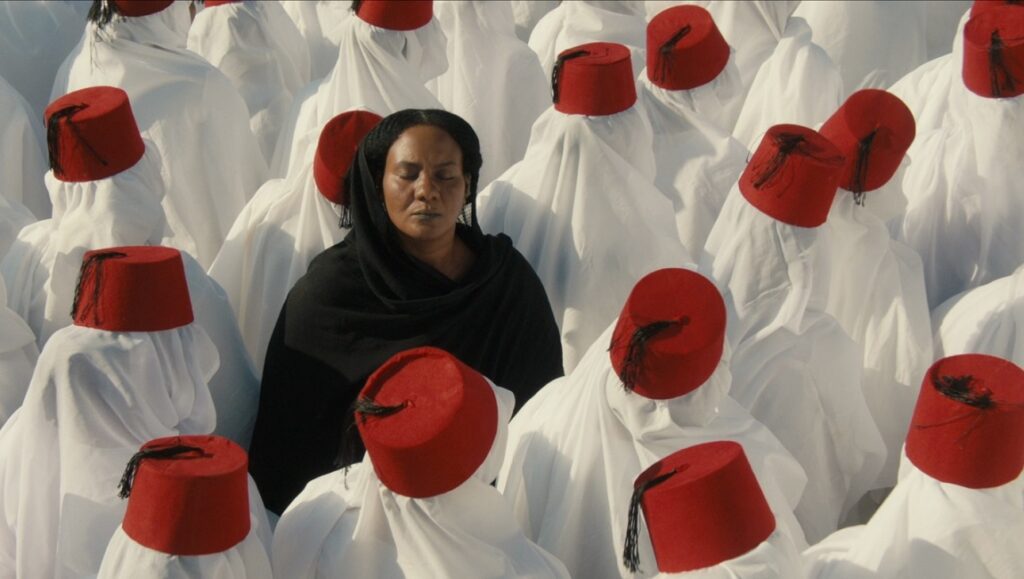You Will Die at Twenty contains plenty of allegorical power, but its ineffectual plotting ultimately teases out more stimulating questions than it does answers.
As a motif in his film, Amjad Abu Alala enacts a small gesture, one intimately coupled to the narrative’s concerns: Muzamil, our protagonist, listens patiently to the beating hearts of those close to him, imagining their vitality, the continued rhythm suggesting a future they are moving toward, sure to live and thrive within. This act, as well as its persisting utility within the film, soon shifts from symbolic lamentation to a flattened expression of contrivance, reflecting both the work’s strengths and the ways in which it staggers. You Will Die at Twenty shrouds itself within the superstition of fatalism, its story gazing inward toward a young boy whose maturity is abstracted by the titular destiny fixed upon him by a shaman. Muzamil, through his coming of age, positions himself as a spectator, terrified to grasp onto anything resembling an extended outlook, shuttering himself away as the most obvious and logical coping mechanism. The affects around him are of general disinterest, mere archetypal signifiers within broad genre trappings. There’s a crush, an estranged father, a hardened mother, an outcast mentor — all mere pawns in the film’s generally predictable psychological mapping. The film continually seeps deeper into the story’s momentum, as Muzamil’s fate encroaches and the philosophical ruminations, which are peppered throughout the periphery, dilute themselves into dramaturgical ramblings that suffice more to motivate an ending of its base narrative mechanisms. Indeed, everything pertaining to his questioned purpose within the community, such as his devotion to the very God that curses him, is deemed inconsequential and dropped. Ultimately, the film has less interest in confronting the spiritual contexts it situates itself within, since, as an ending tag denotes — a remembrance of the victims of the Sudanese Revolution — this is all allegorical.
What You Will Die at Twenty seems to have on its mind, then, is a portrait of the volatility of youth within the context of said revolution. A country’s instability, as political dissent seethes, finds its youngest generation ensnared by violence and ideological rifts, and will see them as the bearers of this cultural shift through the years ahead. The final moment of the film, a conclusive yet ambiguous note — one that sees Muzamil rush into blaring, indiscernible noises — suggests a bedlam that he abruptly and wholly gets swept up by. His life may yet reap its prophecy, as his body becomes lost in a surge of obscured action, the camera streaking through buildings and vehicles as a noise with no source panics — we are cut off from Muzamil, rather curtly. This sudden scramble represents a breaking point, in which the spirits beckoning his death and the material severities he faces collide in a terminal gesture. Such incisive allegorical renderings, where the tumult of a town drowns out our protagonist in his final leap toward life, present far more lucrative ideas to percolate amongst, overshadowing the initial incentives of philosophical/spiritual inquiry. Fatalism as a response to contemporary life’s precarity is certainly a potent and dense matter, a curious analogy that should give such characterization autonomy of its own, separate from the pithy, ineffectual plotting (though ignorance of the relationship that such philosophy has with the cultural spiritualism on display may hinder deeper probing). Notwithstanding, that the much ado of this tag, which incites all of the retrospective analysis, happens at the end and not the beginning means that its influence has already been eclipsed by a withering story so insulated by unmapped superstition (and an inundating score) that the film’s more ruminative qualities face far too much tired opposition. The journey toward present allegorical conceits, shaped into strung-along plotting that drags its characters through to an admittedly stirring end, is only a minimally evocative tool in grasping the substantial weight of the ideas of destiny that You Will Die at Twenty seeks to explore. In that way, unfortunately, the film is more impressive as an inciting incident in drawing out these powerful questions than as the exploratory document it seems to position itself as.


Comments are closed.